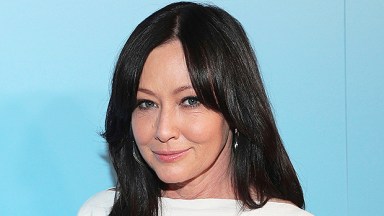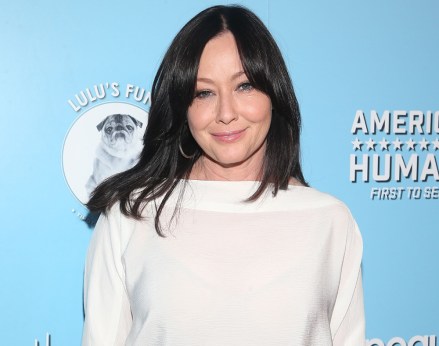
Shannen Doherty, 48, recently revealed that the breast cancer she struggled with in 2015 had returned a year ago, and now, she’s at “stage four”. During her Feb. 4 interview on Good Morning America, Shannen explained, “I don’t think that I’ve processed it. It’s a bitter pill to swallow. There are days when I say…why me? But then I go…well, why not me? Who else besides me deserves this? None of us do.” After the news emerged, HollywoodLife EXCLUSIVELY spoke with Dr. Cary Presant, former president of the American Cancer Society and a top clinical oncologist at City of Hope Los Angeles, one of the nation’s elite cancer hospitals. He explained that highly effective new treatments could allow Shannen to keep working and enjoying her life for many, many years to come, despite the return of her cancer.
“It depends on a patient’s response [to treatment],” Dr. Presant explained. “You can’t predict right away exactly how well she’ll do, but many, many patients, about 80 percent to 90 percent, do have a good remission — and many of those patients will have a good quality of life and a much longer survival. Years — maybe even 10, 20 years.” That’s good to hear, and it’s not like she hasn’t beaten her diagnosis before. Shannen’s cancer went into remission in 2017 after a two year battle, but sadly returned at the beginning of 2019. She kept the diagnosis a secret for a full year, during which time she worked on and promoted the new BH90210 series with very few people knowing that she was sick again.
“Shannen has had this stage 4 breast cancer for a year, and she’s continued to work and no one has noticed,” Dr. Presant said. “She’s a truly courageous example of the fact that you can really survive well with stage 4 breast cancer and that you don’t have to be sick all the time and hanging on your diagnosis for the public to see.”
Dr. Presant, who wrote the 2013 book Surviving American Medicine from iUniverse, also explained what you need to know about new breakthrough treatments if you or anyone you know has breast cancer. “There are some patients who are stage 4 who have very limited stage 4 disease, perhaps just one or two spots in the bone or perhaps several lymph nodes,” he said. “And although we say, ‘Well the goal then is to just control the disease that is never going to be cured’, there are some patients with very limited spread to other organs that have so little cancer there that, in fact, they may be able to be cured by treatment.” That treatment may be “some hormone therapy, some chemotherapy, some biologic therapy and some local radiation for those spots that one has,” he revealed. “And all of us who are taking care of breast cancer patients over the years, had patients who had stage four disease but very limited, and those patients are living and the disease has not come back after their treatments.”
Have the treatments for stage 4 improved in recent years? They’re dramatically, dramatically better. We have recent approvals of different medications by the FDA, so that patients can get access to the newest and best therapies much sooner than they used to be able to do so. Plus, we have clinical trials that combine some of the very best therapies with new drugs that we think will be effective, and those clinical trials will probably continue for the next couple of years.
The newest breakthrough treatments that we have discovered, which are now available to patients, include using targeted types of therapy that targets gene mutations — therapies that improve the effectiveness of the standard hormone treatments. Many women recognize names like Tamoxifen or other medications like Anastrozole, but now we have medicines that can add to those that provide much, much better cancer control than the hormones alone. Hormones, plus targeted types of drugs have really helped to improve the outcomes. We also know that for some types of breast cancer — it depends on the molecular and genetic characteristics of the tumor — we know that we can use immunotherapy now to help control the breast cancer.
What is immunotherapy? Immunotherapy is injection of medicine that allows the body to turn its own immune cells — like lymphocytes and antibodies — to fight the tumor itself. We have new medications that can attack the cancer by turning on the immune system in the patient. These have been very effective, and they seem to have much less side effects than chemotherapy. They’ve very well tolerated, and all of these treatments are outpatient treatments, so it’s rare that a patient has to come in the hospital.
How do you decide what kind of treatment to use on each patient? One of the things we do today is we take the tumor as it comes back when it’s first biopsied, and we do molecular and genetic testing on it to see if it has some of the characteristics that predict for very good responses to hormonal therapy or very good responses to biological therapy or very good responses to chemotherapy. We can then use the characteristics of the tumor to personalize the treatments, so we get the best results right away.
In some cases, [the cancer] is controlled well enough that you can add a little radiation therapy to local spots, and perhaps control the disease so it does not come back. But, that’s a small number compared to the numbers that have a disease that is put into remission, and then they have a good quality of life, but then it may show its face again. Which particular pathway Shannen goes on will really depend upon how well she does and what the characteristics of her tumor are.
What does it mean that Shannen has ‘stage 4’ cancer? When breast cancer is first diagnosed and it’s localized in the breast, it’s usually stage one, two or sometimes three meaning, that it’s either totally within the breast or the breast and the lymph nodes, or even if it’s a large tumor, a stage three, it’s still curable. And that’s really, really good. Stage 4 means it has spread to organs beyond the breasts and the local lymph nodes. And that could include the common site, which is bones, could sometimes include spread to the lungs or the liver. But for many women with stage 4, it’s just in the bones or bones plus maybe the lining around the lung produces some fluid. So they might have a little bit of fluid around the lung.
Of course, we don’t have the full details of Shannen’s diagnosis, that’s private for her, but we hope that it’s limited stage 4, and even if it’s not, we hope it’s very responsive to treatment so she can continue to enjoy her life with her husband and continue to really have a good career.


